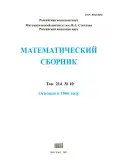Vol 214, No 10 (2023)
Abnormal extremals in the sub-Riemannian problem for a general model of a robot with a trailer
Abstract
A symmetric mathematical model of a wheeled robot with a trailer is considered for various types of coupling between the robot and the trailer. It is shown that for fixed coupling parameters and fixed initial position of the robot with trailer there are two symmetric abnormal extremals. In motion along these trajectories the robot and the trailer traverse normal extremal trajectories for the sub-Riemannian problem on the group of motions of the plane; the coupling point always draws an inflectional elastica or a straight line.
 3-24
3-24


On a weak topology for Hadamard spaces
Abstract
 25-43
25-43


Complete bipartite graphs flexible in the plane
Abstract
A complete bipartite graph $K_{3,3}$, considered as a planar linkage with joints at the vertices and with rods as edges, is in general inflexible, that is, it admits only motions as a whole. Two types of its paradoxical mobility were found by Dixon in 1899. Later on, in a series of papers by several different authors the question of the flexibility of $K_{m,n}$ was solved for almost all pairs $(m,n)$. We solve it for all complete bipartite graphs in the Euclidean plane, as well as on the sphere and hyperbolic plane. We give independent self-contained proofs without extensive computations, which are almost the same in the Euclidean, hyperbolic and spherical cases.
 44-70
44-70


On the eigenfunctions of the essential spectrum of the model problem for the Schrödinger operator with singular potential
Abstract
We are concerned with generalized eigenfunctions of the continuous (essential) spectrum for the Schrödinger operator with singular δ-potential that has support on the sides of an angle in the plane. Operators of this kind appear in quantum-mechanical models for quantum state destruction of two point-interacting quantum particles of which one is reflected by a potential barrier. We propose an approach capable of constructing integral representations for eigenfunctions in terms of the solution of a functional-difference equation with spectral parameter. Solutions of this equation are studied by reduction to an integral equation, with the subsequent study of the spectral properties of the corresponding integral operator. We also construct an asymptotic formula for the eigenfunction at large distances. For this formula a physical interpretation from the point of view of wave scattering is given.
Our approach can be used to deal with eigenfunctions in a broad class of related problems for the Schrödinger operator with singular potential.
 71-97
71-97


Generic extensions of ergodic systems
Abstract
The paper is devoted to problems concerning the generic properties of extensions of dynamical systems with invariant measures. It is proved that generic extensions preserve the singularity of the spectrum, the mixing property and some other asymptotic properties. It is discovered that the preservation of algebraic properties generally depends on statistical properties of the base. It is established that the
 98-115
98-115


Efficient computations with counting functions on free groups and free monoids
Abstract
We present efficient algorithms to decide whether two given counting functions on nonabelian free groups or monoids are at bounded distance from each other and to decide whether two given counting quasimorphisms on nonabelian free groups are cohomologous. We work in the multi-tape Turing machine model with nonconstant-time arithmetic operations. In the case of integer coefficients we construct an algorithm of linear time complexity (assuming that the rank is at least 3 in the monoid case). In the case of rational coefficients we prove that the time complexity is O(NlogN), where N denotes the size of the input, that is, it is the same as in addition of rational numbers (implemented using the Harvey-van der Hoeven algorithm for integer multiplication). These algorithms are based on our previous work which characterizes bounded counting functions.
 116-162
116-162











